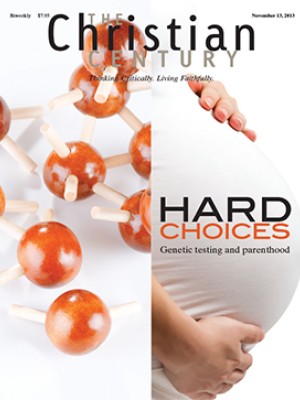Sunday, November 24, 2013
On Christ the King Sunday it seems pastorally heavy to drag ourselves to the foot of the cross. On the other hand, maybe it’s exactly the right move.
Luke makes certain that we don’t miss the double death dealt in the moment when human power shows its worst side. Not only is Jesus executed; he is humiliated. The leaders scoff, the soldiers mock, a criminal derides. It’s as if the collective murdering machine is making sure to communicate that “we’re not killing Jesus because he’s powerful, we’re killing Jesus because he’s a Nothing who is pretending to be powerful.”
We 21st-century people don’t think of these powers, however, when we hear “Christ the King,” because our ears have become dull and desensitized to this title. Royals don’t rule us; we no longer use this term. Yet it’s crucial that we remember that the first-century in Galilee was a time of kings and rulers, as well as a time of huge social change and upheaval. The roots of our faith are located here, not in isolated issues of individual piety, but rather in resistance to the idolatry of power—specifically, the Roman Empire and Herodian Jerusalem.
Read our latest issue or browse back issues.
Idolatry of power might be the easiest sin to illustrate, since a preacher can point to Judas as an ideal and relatable example. Judas’s betrayal of Jesus came with an idolizing of power. Judas saw in Jesus a long-awaited Messiah who would clean up the politically perverted mess that the nation of Israel had become, but then he realized that Jesus was not going to wave a sword and effect change by any means necessary. Judas’s disappointment grew because he could not conceive of kingship in any manner that did not involve might and violence.
The mocking and daring at the cross followed this same theme: “Are you a king, or aren’t you? If you are, then do something king-like!” So taunted one criminal, in a display of petty tyranny. Most of us can point to some time in our lives when wrenching pain or moments of despicable evil found us wringing our hands and beseeching God, “If you’re really God, then please . . . !” We have all been the first criminal.
Similarly, we have all been the second criminal, the one who recognized Jesus’ power. Scolding the first criminal, this one said, “Jesus, remember me when you come into your kingdom.” We seek to have the eyes and heart of the second criminal and to not fail to see Jesus when he is manifest before us.
Which brings us back to the question of power: How are we to think of Christ? As an alternative king? A model emperor? As our heavenly ruler, the one who matters in a material world that does not? It’s confusing, since we are part of a church that has, since the fourth century, connected and mirrored ecclesiastical structure with earthly empire structure. As cathedrals were built, the power of the state grew as well and became intertwined with the power of the church triumphant.
In Colossians 1, Paul makes an audacious attempt to sort out the powers of the universe. “For in him all things in heaven and on earth were created, things visible and invisible, whether thrones or dominions or rulers or powers—all things have been created through him and for him” (v. 16). Walter Wink helps us here. Rather than sorting heavenly from earthly and spiritual from material, Wink insists that the powers have their being only because of God in Christ and exist to serve the purpose of the whole creation as it comes to its focus in him.
In other words, whatever we mean for evil, including our earthly distortions of power, God means for good. Our best bet is to steward power as faithfully as we can, aligning our decisions with our theology. This is easier said than done, but we make great strides in our faith if we can, together and individually, grow in our awareness of to what and to whom we give our power. To whom do we give the power to tell us who we are? Who has the power to tell us whether or not we are valuable or successful? Who or what has the power to shape our moods and our minds, influence our decisions, tell us whether we are safe or unsafe, and help us discern what is important and what is not? How might we act more as if we know that, through God, Jesus Christ is the Power of Powers?
Perhaps there is no better time to consider our personal distortions of power than the Sunday before Thanksgiving. For most of us, comparing Golgotha with our family dinner table is probably a stretch. Or maybe not. Our families can offer us glimpses of the face of God, but they also give us glimpses of human beings at their worst.
Luke tells us that Jesus accompanies us, and even asks forgiveness on our behalf, amidst relational violence and brokenness of all sorts. Jesus exhibits capacities fit only for a King of kings.






